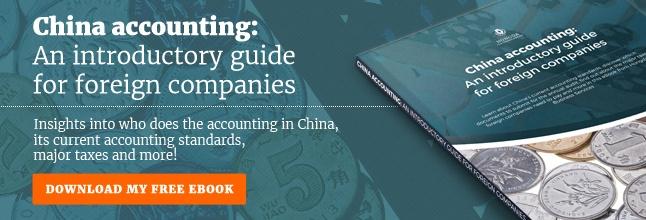When doing business in a foreign country, local laws, regulations and standards are something that you must get familiar with to. After years of development, the Chinese Accounting Standards (CAS) is now very similar to the international standards, despite the slight differences. Here are the top 3 tips that you should know regarding CAS and IFRS.
Anyone who has been to China will probably tell you that they do things very differently over here, and that includes Chinese accounting standards!
Foreign companies coming to China for the first time will be faced with very different attitudes towards accounting, and could potentially get caught out. While getting good local China accounting advice is almost certainly going to be necessary once you're on the ground, it can't hurt to be aware of a few home truths before getting started.
What are the Chinese Accounting Standards (CAS)?
The Accounting Regulatory Department of the Ministry of Finance (MoF) in China is the leading body that developed the Chinese Accounting Standards(CAS). The main goal for these principles is to place less emphasis on profitability and focus more on assets available to a company. The CAS, also referred to as the Chinese GAAP, consists of:
- The Accounting Standards for Business Enterprises (ASBEs)
- the Accounting Standards for Small-Sized Business Enterprises (ASSBEs)
In this blog post, we're going to look in more detail at 3 of the common quirks, facts, tips, and differences between accounting in China and what we're used to in Western (and other foreign) countries.

What you need to know regarding the Chinese Accounting Standards (CAS)
1. Vet Local Chinese Accountancy Firms Carefully As They Can Play Fast And Loose With The Law
In China there's the legal way, and then there's a way where corners are cut. Of course it's better to stay within the law at all times, but how do you know that your account is keeping on the straight and narrow?
Well, first it's important to know the basics about what employers in China are required to do by law as regards accounting:
- Companies must file their financial statements and business tax returns monthly and in Chinese
- CIT (corporate income tax) must be filed quarterly
- Every employee must have a written, signed, and stamped contract (in Chinese) which outlines their salary and overtime matters
- Profit and Loss statements must be produced in Chinese and English
- Both staff and management need to pay IIT (individual income tax), even if there are few managers and many staff
- A reliable annual China accounting audit where a CPA (certified public accountant) will assess your accounts' compliance and report back to the local MOF authorities, earning you a higher grade of trust
- Before repatriating profits will be allowed, companies must have undertaken an annual China accounting audit, and have paid CIT
If any accountant tells you anything other than this, then there is a chance you could be sailing into stormy waters in future.
2. Since 2007, Chinese Accounting Standards (CAS) Have Become 90% Similar to IFRS and Soviet Accounting Was Discontinued
International Financial Reporting Standards (IFRS) is the commonly held accounting standards in the West, meaning that accounting practices are consistent and understandable across borders.
As you can imagine, before China got into line with them with CAS it was very hard indeed to fathom China accounting. Instead it was a fund accounting system where companies' assets were laid out and it was possible just to assess productivity, as in the near past all major industry and commerce was controlled centrally by the CCP, and so companies only needed to report their productivity by the end of the financial year.
Obviously in more recent years with foreign companies now opening WFOEs and other business types in China regularly, it was important that accounting standards were brought up to date in order to reflect profitability rather than productivity. In a more free market Chinese economy today, the old Soviet ideals of breaking even and being as productive as possible went out of the window.
3. Are There Differences Between CAS & International Accounting Standards?
Yes. As mentioned CAS is about 90% the same as international accounting standards.
While Chinese accounting standards (CAS) and IFRS have demonstrated key similarities, foreign companies should take note of the core differences to avoid any penalties or conflict with the law.
Chinese GAAP vs. US GAAP and IFRS
- Companies must deal directly with the Ministry Of Finance (MOF) when submitting accounts in China.
- Foreign transactions must be converted to RMB using the government's official rate.
- The financial year begins on Jan 1st in China, running until the Dec 31st.
- Chinese accounts are generally classified by function, as opposed to the international standard to classify them by their nature.
- Businesses that use IFRS have the option of choosing their preferred method of valuation for certain types of fixed assets. However, under CAS, the historical cost method is more widely used, particularly for private firms since it is difficult to obtain fair-value information.
- Fiscal year in accounts must begin on 1st January.
- Companies will need to inform the MOF of the identity of the business partners.
- Accounts must be filed monthly, and indirect cash-flow statements and comments on fairness of transactions must be provided within them.
- Accounting rules are not hard and fast throughout the entirety of China. In fact they may differ from city to city, and indeed even between districts of a certain city.
Below is a summary table of some of the key differences between CAS and IFRS.
Chinese Accounting Standards (CAS) |
International Financial Reporting Standards (IFRS) |
|
Valuation of fixed assets can only be done using the historical-cost method. |
Businesses have the option to use historical-cost method or re-evaluating the asset. |
|
Filing of tax returns and financial statements is done on a monthly base. |
Returns can be filed on a quarterly or Bi-monthly basis. |
|
Chinese accounts are generally classified by function. Companies must deal directly with the Chinese Ministry Of Finance (MOF) when submitting accounts in China. |
International standard to classify them by their nature. |
|
Fiscal year in accounts must begin on 1st January. |
Fiscal year doesn't have to start in January. You can choose to start it at any point, as long as it spans 12 consecutive months. |
Final Thoughts
Doing business in a foreign country is never simple, and the same goes for China. Since Chinese accounting standards differ from the more commonly known Western standards, and with requirements stating that the accounting must almost completely be done in Chinese, many foreign companies will need assistance.
Hiring a local accountant could be a solution, but you need to watch them like a hawk and make sure that they're not, inadvertently or otherwise, cutting corners which could cause you to fail your annual audit; or you could outsource to local accountancy experts like Hongda who will handle everything from completing your books, to paying taxes for you.
Whatever you decide to do, make sure that you don't go into things blind, as by having even an overview of the way things are supposed to be you are able to make better business decisions moving forward.





